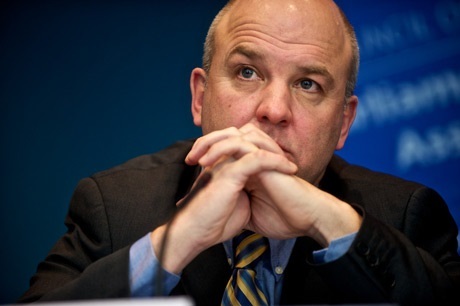By Steven McCaffery
THE Westminster government cannot devolve the responsibility and the cost of investigating the Troubles to Stormont, a leading European official has said.
Council of Europe Commissioner for Human Rights Nils Muižnieks told a major conference in Belfast today that the deaths, including state killings, took place when Northern Ireland was under Direct Rule from London.
His comments come as reductions in real terms to the block grant from London to Stormont have seen cuts to victims’ groups and forced the police service to effectively close its Historical Enquiries Team (HET) which was investigating killings from the Troubles.
Mr Muižnieks was asked by a member of the audience whether it was acceptable that the UK government had left the Stormont Assembly to fund historic investigations, despite Westminster’s obligations under Article 2 of the European Convention on Human Rights.
He said: “Regarding the possibility of delegating Article 2 responsibilities, I think it’s quite clear that if a country were to do this…it would be quite a disaster.
“I think with regard to the UK, as far as I am aware, the violations that took place during the Troubles took place primarily during a period of Direct Rule from Westminster.
“I don’t think that the UK government can divest itself of investigatory responsibility or funding responsibility for investigations.
“Of course this must take place in conjunction with the devolved authorities, but I don’t think Westminster can wash its hands altogether.”
The conference on dealing with the past focused on the Right to Life in Article 2 of the European Convention on Human Rights (ECHR).
The Conservative Party recently proposed the repeal of the UK’s 1998 Human Rights Act, to effectively exit the ECHR.
But in a further significant comment at the University of Ulster conference in the Ulster Hall, Mr Muižnieks said such a move would still leave the UK liable for deaths caused prior to any repeal of the human rights act.
Political talks are currently ongoing between the British and Irish governments and the parties at Stormont in the latest of a series of failed bids to agree a comprehensive method of dealing with the past.
In the absence of agreement, piecemeal efforts are ongoing by various institutions within Northern Ireland.
Speakers at the conference included Police Ombudsman Michael Maguire, whose investigations into the past have also been hampered by funding cuts from Stormont.
Attorney General John Larkin was also among those to address the event. So too were lawyers and lobby groups involved in pursuing historic cases through inquests, who said delays in hearings, in the release of official documents, plus funding issues, were barriers to securing the truth in State killings.
Deputy First Minister Martin McGuinness and Sinn Féin MEP Martina Anderson, who had taken victims to Europe to meet officials, both attended the event.
But despite the prestigious list of academics, lawyers and lobby groups at the venue, it was an intervention from the floor that sparked applause from the audience.
Anne Service, whose 35-year-old son Brian was shot dead by loyalists in a sectarian killing in 1998, stood up to ask a question.
She said that victims too often “get used”, adding “they play ball with us”.
Speaking of her family’s continuing battle for the truth behind her son’s murder, she added: “My son‘s anniversary was last week on Halloween night.
“His body came into us when the fireworks were going off.
“I was 59. I am now 76 and I want my voice to be heard.
“We came from districts where there was great unemployment. My son had worked in England and then came back.
“My son would have been better had he not been born, because you mock us.
“My husband has now died.
“I am 76. How many years have I got to fight and to wait?
“What do I say to my son if there is a God? What do I say to my son – `I tried’?”
Mr Muižnieks said: “I am very glad you took the floor. I think that we have to be reminded again and again and again – what delays and the lack of justice, the lack of information – the anguish that causes.
“I think for many people who are engaged in bureaucratic turf wars, who cannot agree politically, they forget that in the end, these issues are not abstract issues of the rule of law only. They touch the fates and the wellbeing of individual people, many of whom are in pain.”
 By
By
